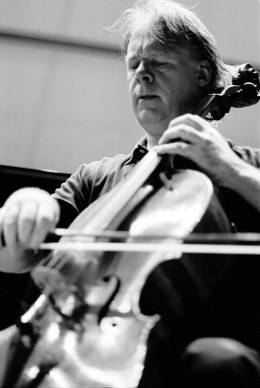
Italy, Circa 2000. Lynn Harrell
Lynn Harrell is a world-renowned classical cello player. Former artistic director at the L.A. philharmonic institute, he has played with some of the world’s leading orchestras, from San Francisco to Berlin. He founded a charity that helps children recover from poverty and conflict through music. It doesn’t sound like the resume of a criminal, but Harrell claims Delta Airlines is treating him like one.
Harrell regularly travels for his work and always takes his cello with him — buying an additional seat for it so as not to subject the delicate instrument to the cold, dry air and low pressures of the cargo compartment. For the past 11 years he’s being flying Delta, while both he and his instrument, which flies under the name Mr. Cello, accumulate a nice bundle of air miles.
(VIDEO: Musical Saw Players Want a Little Respect)
However, in January 2012, more than a decade after he signed up to the program, Delta decided it was time for Harrell’s cello to stop earning free miles. They terminated his SkyMiles account, canceling years of credit accumulated by both Mr. Cello and Harrell himself. Earlier this week, Harrell described in his blog the shock he felt in receiving an official letter from the airline. “Like most rejection letters, it started off with such a polite tone I thought it was going to be good news but it turned ugly in short order,” he wrote. “By the end, it seemed as though they were trying to make me feel like some sort of master criminal.” According to Harrell, Delta said it had sent him a warning as early as 2001, stating that the company’s terms and conditions prohibited a musical instrument from earning air miles. Harrell claims his travel agent never received any warning. The program rules state that “only one person may be enrolled per SkyMiles account” while “members may not maintain more than one SkyMiles account.” This means those who are obliged to purchase an extra seat, whether it’s due to obesity or because they’re traveling with a precious work of art, are also only entitled to one seat’s worth of miles. Delta did not respond a request for comment, according to NBC News.
Airlines and musicians have a long and troubled relationship. In 2009, a Canadian singer/songwriter named Dave Carroll posted a music video to YouTube expressing his frustration at United Airlines after baggage handlers damaged his $3,500 Taylor guitar at Chicago‘s O’Hare airport. The video, “United Breaks Guitars,” became a viral hit, as well as a humiliating public relations disaster for the airline. In 2010, a 12 year-old British violinist traveling with her parents was not allowed to board a Ryanair aircraft, according to the BBC, after airline staff told her the instrument was too big to fit in the cabin and demanded that the young girl pay a $65 baggage fee to put her violin in the airplane’s hold, where her family worried it would be damaged.
(MORE: Mozart vs. the Gangstas: How Classical Music is Changing Young Lives)
Ryanair, the famously cheap European budget airline, is an object of particular scorn. “It’s just penalizing working musicians for doing their job,” Keith Pascoe, an Irish musician and founder of the Facebook group Musicians Against Ryanair, said to Business Insider earlier this year. Meanwhile others have lauched a petition on the website change.org calling for fair treatment for musicians traveling on planes with their instruments. (If all else fails, perhaps musicians should turn to Charlie Chadwick for some innovative ideas on how to fold up your instrument as small as possible.)
Progress has been made for musicians traveling within the U.S. In February, Congress passed a Federal Aviation Administration reauthorization bill to standardize the airlines’ “inconsistent and arbitrary” rules for traveling with instruments. The bill provides airport personnel with guidelines on which instruments are allowed in the cabin and where, and which should be stored in the cargo hold. Ray Hair, President of the American Federation of Musicians, has hailed the amendment as “great news for professional musicians throughout the U.S. and Canada,” according to the music rights management company BMI.
But for now, cellist Harrell will be looking elsewhere for travel options — like airlines that continue to award air miles to those musicians who pay the full price of a seat. “To all of those airlines,” says Harrell, “and you know who you are, I say thank you and you can expect me and Mr. Cello to continue to be a loyal customers for years to come.”






